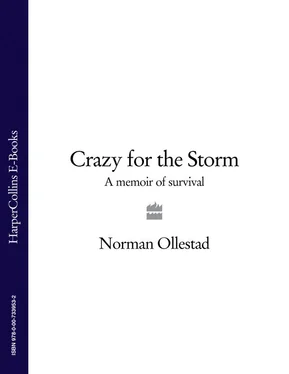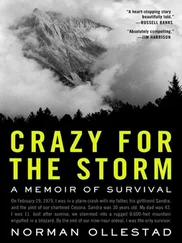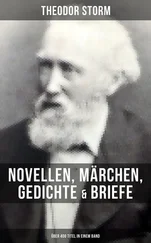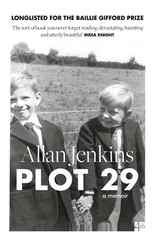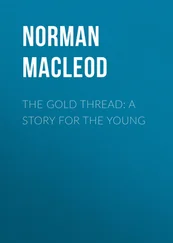A bristle of pine needles streaked past the window behind him. A shock of green, clawing open the mist. It was snowing now. Then a spiky limb lunged at the window. An evil ugly thing that Dad was unaware of. It sucked all life from the cabin, scorching the scene like a photograph eaten by fire. Suddenly my dad’s face was blotched and deformed.
Time seemed to decelerate as if lassoed by a giant rubber band. Fog pressed against all the windows and there was no up or down, no depth at all, as if the plane were standing still, a toy hanging from a string. The pilot reached down with one hand and spun the knee-high trim wheel. I wanted him to spin the dial faster—we’ll climb faster, away from the trees. But he abandoned the trim wheel and steered the giant W with both hands, jerking us side to side. What about that dial? Should I spin it for him? A branch out the window caught my eye.
Watch out! I yelled, curling my four-foot-nine, seventy-five-pound body up tight.
The wing clipped a tree, sending a thud into my spine, and the plane twisted ass-backwards. We bounced like a pinball off two more trees—metal ripping, the engine revving. I was fixated on the trim wheel. Too late to spin it now….
We slammed into Ontario Peak, 8,693 feet high. The plane broke apart, flinging chunks of debris across the rugged north face and hurling our bodies into an icy chute.
We were sprawled amongst the wreckage. Our bodies teetered on the 45-degree pitch threatening to plunge us into an unknown freefall. Exposed to freezing snow and wind, we dangled 250 feet from the top—the distance between life and death.
THE SUMMER BEFORE the crash my grandmother’s washing machine broke. Grandma and Grandpa Ollestad had retired to Puerto Vallarta, Mexico, and the inflated prices for appliances in Guadalajara or Mexico City would have strained their budget. Also, renting a truck and picking up a new machine themselves was a major ordeal in those days. So my dad decided he would go to Sears, buy a new washer and haul it down to Vallarta himself. He would borrow Cousin Denis’s black Ford pickup, cross the border in San Diego and cruise the Baja Peninsula highway all the way to La Paz. He’d take the ferry across the Sea of Cortez to Mazatlán, which was mainland Mexico, then head farther south through the deep jungles, hitting as many of the rumored surf spots as he could before reaching Vallarta.
Hearing this news made me stiffen with fear. I went silent when my mom explained it all to me on our way home from summer school, where she taught second grade and I was preparing for sixth. She didn’t say anything about me having to go but it was in the air—looming—more threatening than if it were a certainty. The idea of baking inside that pickup truck for three or four days and hunting for surf—and worse, finding it and having to paddle out in big waves and float alone out there with just my dad in the vast sea—was not appealing at all. He would be focused on the surf and I would be left to fend for myself. I envisioned my body crushing under the lip of a wave, tossing around, clawing upward, gagging for air.
Mom’s car turned onto the Pacific Coast Highway and I heard the ocean shushing. I was staring at my blue Vans, listening to the Beatles on the eight-track, and I felt carsick and had to look out the window.
We arrived at my mom’s house on Topanga Beach, the southern-most cove in Malibu. The homes were built right on the sand, slapdashed together and teetering at all angles as if shelter were an afterthought, second to the essential need of being on the beach. My dad used to live there also. When I was three he moved across the highway into a cabin on the edge of Topanga Canyon. By the time I was ten I had gathered various tidbits of information, forming a sketchy portrait of what broke up my parents.
Mom complained that sometimes the phone would ring in the middle of the night and Dad would leave without a word and return with no explanation. Mom knew it had to do with Grandpa Ollestad or Uncle Joe, my dad’s half brother, who always needed Dad to save their ass, but Dad wouldn’t talk about it. When Mom protested her exclusion from certain family secrets, my dad just shrugged it off. He would go surfing or simply walk away if my mom persisted. The final straw had been when my dad secretly loaned Uncle Joe money from Mom and Dad’s joint savings account and then refused to tell my mom why. Right after this incident a French guy named Jacques came to visit. He was a friend of a friend of Dad’s. My dad had just gone through major knee surgery and could barely move around, so he loaned Jacques a surfboard and called out instructions from the porch, using his crutch to guide Jacques to the takeoff spot. Dad didn’t have the strength to show Jacques around Malibu, so Mom took him to Point Dume—a chain of pristine coves—and to Alice’s restaurant on the pier, and to the Getty Museum. After Jacques went back to France Dad stopped coming home at night. This lasted a couple of weeks. Then he returned for a few days, until he finally moved his stuff into the cabin across the highway.
Mom started hanging out with a guy named Nick. Right from the get-go Nick liked to mix it up, which was the opposite of my dad, who was reluctant to fight with my mom. Nick and Mom had spectacular clashes in front of everyone on the beach. It wasn’t that abnormal really—a lot of people on Topanga Beach who were married were kissing other people, fighting with their new boyfriends or girlfriends, and suddenly moving into other houses. It was an incomplete picture of what went wrong between Mom and Dad. Something was obviously broken, that’s all I knew, and was forced to accept it.
Mom parked the car in the garage and I immediately found my three-legged golden retriever Sunshine. She was waiting on the outdoor walkway that ran along the side of our house. Sunny and I ran to the porch, jumped over our beach stairs and ambled up the beach to the point—a curve of sand that came to a tip at the north end of the cove.
Two girls my age cantered their horses bareback through the waves washing along the shore. I held Sunny so she wouldn’t spook the horses. The girls lived up the canyon in the Rodeo Grounds, below where my dad lived, and as always we just waved to each other. The horses kicked up salt water onto the girls’ legs, which shimmered in the late afternoon light.
When they disappeared up the mouth of the canyon I threw Sunny’s stick into the surf. A blond dude with a long beard dressed in full Indian garb did a rain dance toward the setting sun. He reminded me of Charles Manson, who was always hanging around the beach when I was a baby, and used to serenade my aunt while she rocked me in her arms on our beach stairs.
Good thing I never went up to that commune he kept talking about, my aunt said when she told me the story.
After dinner I tried to fall asleep to the crashing waves. I read the Hardy Boys to help take my mind off the trip to Mexico. Later I woke and made a tent with my covers and played a spy game, radioing secret information to headquarters via the rusted posts of my old brass bed. Sunshine lay curled at the foot of the bed and guarded our hideout. I petted her and told her about how I hated having to surf, hating not being able to play all weekend like the kids in the Pacific Palisades.
I often complained to my dad about not living in a neighborhood. He told me that one day I’d realize how lucky I was living right on the beach, and that since Eleanor (my unofficial godmother) lived in the Palisades and I got to stay there sometimes, I was doubly lucky.
But she doesn’t have a pool, I said, and Dad rebutted that I had the biggest pool in the world right in my own front yard.
Before I was born my mom used to work at Eleanor’s nursery school, Hill’n Dale, and my parents became close friends with Eleanor and her husband Lee. I started going to Hill’n Dale when I was three and Eleanor immediately lavished me with attention. We have the same birthday, May 30, she liked to tell everyone. Ever since the first grade I had walked the two blocks from grammar school to Hill’n Dale, hanging out there until my mom or dad picked me up after work. All those years of seeing Eleanor practically every day made me think of her as my other mother , and I told people so.
Читать дальше
